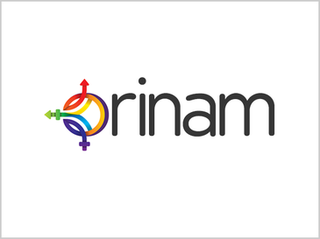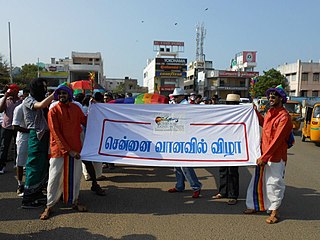History

2008
Delhi's first Queer Pride March took place on 30 June 2008. [3] In the beginning, only a small bunch of men and women arrived, and police was also there, but by evening, there were about 500 people singing, dancing, shouting slogans, holding placards, screaming "377, quit India". [5]
The first ever parade was attended by 500 marchers, who carried rainbow-coloured flags and "Queer Dilliwalla" banners marched to bhangra beats. The parade began from Barakhamba road in the heart of the city's business district and went on till Jantar Mantar, an 18th-century astronomical observatory. [6]
2009
The second Delhi Queer Pride was held on 28 June 2009, [7] and was attended by over 2000 people. It took about two months to organise the march, according to queer activist and key event organiser Lesley A Esteves. [8]

2010
The third Delhi Queer Pride was held on 28 November 2010. [9] More than 3500 people attended, including grandparents and family members of the LGBT community. [10] This pride parade was a celebration on the account of the repealing of section 377 on the 2nd of July 2009, on account of the public interest litigations (PIL) files by Naaz Foundation. [11] [12]
2011
The fourth Delhi Queer Pride was held on 27 November 2011. [13] The march ended in Jantar Mantar with a reading of the "Charter of Demands for LGBT Rights" and a two-minute silence for those who died in the recent Nand Nagri fire tragedy. [1]
2012
The fifth Delhi Queer Pride was held on 25 November 2012, followed by a picnic near India Gate. The theme for this march was Gender Variance and Identity and Expression. [14]
2013
The sixth Delhi Queer Pride was held on 24 November 2013. Around 700 people marched from Barakhamba Road to Jantar Mantar. [15]
Many articles were published featuring the organiser, Mohnish Malhotra. [16]

2014
The seventh Delhi Queer Pride held on 30 November 2014, was the first pride march after the Supreme Court reinstated Section 377 of the Indian Penal code, which criminalises 'unnatural sex'. [17] The community walked to reinforce their identities with this year's theme 'No going back.' [18] Around 700 people danced and walked against Section 377. [19]
2015
The eighth Delhi Queer Pride was held on 29 November and kickstarted from Tolstoy Marg at 2 PM. [20] The march saw hundreds of LGBTQIA+ people and allies walk the two-km stretch from Barakhamba road to Jantar Mantar, ending with a range of performances. [21] The statement this year talked about freedom not just from Section 377, but freedom from all social injustices. [22]
2016
On 27 November 2016, the ninth Delhi queer pride took place on the streets of New Delhi from Barakhamba Road to Tolstoy Marg. [23] This march saw a larger turnout, where about 800-1000 people turned up. Members of the LGBTQIA+ community as well friends and families came with placards, masks and costumes. [24] This year's march demanded freedom and solidarity for Dalits, Muslims, women, disabled people, Kashmiris, people in the North-East, Adivasis, academics, filmmakers, and students. [23] [25]
2017
On 12 November 2017, Delhi hosted its tenth queer pride parade at from Barakhamba Road till Jantar Mantar. Hundreds of people gathered together to support the queer community and demand the repeal of Section 377. The demand was to build a proper system of hate crime legislation which conceptualizes all forms of violence against minorities as a punishable offence. They also demanded to repeal Karnataka Police Act 36, Hyderabad Eunuch Act and remove the marital exception from the rape laws which should offer redressal to all victims/survivors of sexual assault irrespective of gender. [26] [27]
2018
Delhi Queer Pride 2018 was held on November 25, 2018. The march, like every year, started from Barakhambha Road. [28]
This was the first Pride in Delhi after section 377 was read down by the Supreme Court of India, which decriminalised homosexuality. The energy and the enthusiasm was visible in the turnout, with more than 5,000 people from all walks of life marching. [29] [28]
A group of people danced their way under the nearly 15-metre-long pride rainbow flag, accompanied by dholakwalas. Participants in bright, colourful sarees and feathered head accessories posed with onlookers for selfies and videos, as they marched for more than four hours. [29]
2019

On 24 November 2019, members of the LGBTQ+ community people organised the parade where more than 1000 people joined. [30]
2020-21
Because of COVID-19, the Delhi Queer Pride Parade in 2020 and 2021 was cancelled.[ citation needed ]
2022-23
Because of elections, and delay in permission, the 13th Delhi Pride was postponed from November, and was held on 9 January 2023.
It was the first offline Delhi Pride Parade after the COVID pandemic. Thousands of people marched from Barakhamba Road Metro Station and assembled near Jantar Mantar. [31] [32]
This pride parade happened during the time when the cases for recognition of same-sex marriages were pending in various regional courts and were collectively transferred to jurisdiction of Supreme Court by itself. [33] [34] Thus this parade emphasised on demands of recognition of same-sex marriages. [35]
The number of people who participated in this march is estimated to be around 12,000, [36] significantly higher than previous years.
2023-2024
People of Delhi came out of their homes to participate in Delhi Queer Pride Parade-2023. This parade started from Barakhamba Road and ended at Jantar Mantar. About 15000 people have participated in it. Celebrating sexual diversity this time the parade has felt the spirit of struggle for marriage rights. [37] [38] This year's march also had protesters speaking out for Palestine and calling for an arms embargo.

A long-pending decision on the marriage rights of gay people came out this year, but it has disappointed the community. There is a feeling of protest regarding this very thing in the Pride Parade 2023. [37]
Judges from five benches of the Supreme Court, including the Chief Justice, have heard 21 petitions seeking legalisation of the right to marriage for the LGBTQ community. The people of the society were waiting for the historic decision, but the result was not good.
The people who participated in this parade have not lost hope in the struggle. The parents of the gay child also joined hands with the people and sought support from the society for the community. [38] [39]








